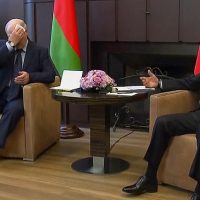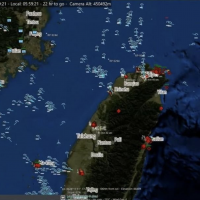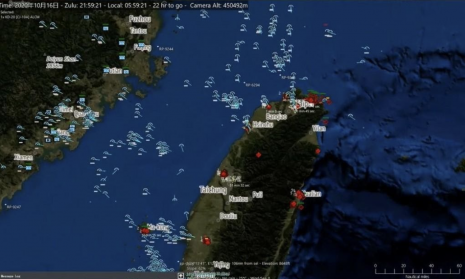
Republished from the Radio War Nerd subscriber newsletter. Subscribe to the Radio War Nerd podcast hosted by Gary Brecher & Mark Ames for podcasts, newsletters and more!
It’s a full-time job, keeping track of the US/NATO campaign to start a fire somewhere on China’s borders. It’s like tracking an inept arsonist by satellite image: “Oh, there he goes again…the idiot started a trash fire next to a concrete wall.”
Of course, no one who matters in the defense business wants total war with China. They just want to keep those trash fires burning, hoping one of them will blaze up big, like a gender-reveal wildfire. And even if none of them do, it’s good for business, because most war scares are about funding. The US Navy always, always wants more ships. What’s scarce is plausible reasons to buy them.
So when you read US analyses of the Taiwan situation, you have to remind yourself that this isn’t necessarily about a real war. That’s a lesson you learned the hard way if, like me, you’re old enough to remember the NATO/Warsaw Pact war that was always just about to happen. Looking back, it was never going to happen. The whole idea was absurd, because that war would have gone nuclear in a half hour, and nobody in power wanted that.
So when you read some hyperventilating wonk enthusing over a 21st c. Anaconda Plan to blockade China, remember that it’s budget season (because it’s always budget season at the Pentagon), and nobody who matters could really imagine that reviving the Anaconda Plan, which didn’t even work very well against the Confederacy, is gonna work against the PRC and its long-range anti-ship missiles.
There’s a catch, though. The US/NATO command may be woofing just to get more ships and planes funded, but woofing can go badly wrong. The people you’re woofing at may think you really mean it. That’s what came very close to happening in the 1983 Able Archer NATO exercises. The woofing by Reagan and Thatcher in the leadup to those exercises was so convincing to the Soviet woof-ees that even the moribund USSR came close to responding in real—like nuclear—ways.
That’s how contingency plans, domestic political theatrics, and funding scams can feed into each other and lead to real wars.
Military forces develop contingency plans. That’s part of their job. Some of the plans to fight China are crazy, but some are just plausible enough to be worrying, because somebody might start thinking they could work. Case in point, this plan to defeat a PRC invasion of Taiwan:
“The only method of preventing China from successfully annexing Taiwan is to reject calls for a cease-fire, contain Chinese bridgeheads and airheads into as small a perimeter as possible, and then drive the invaders into the sea. Contrary to the limited Army supporting role envisioned in the Pacific, an Army corps will be indispensable and must be fully incorporated into U.S. Indo-Pacific Command (INDOPACOM) Taiwan contingency plans.”
Taiwan is the most promising theater for US military planners for pretty simple, obvious reasons: it’s an island in an area where the US has massive bases. Since US military power is mostly sea- and air-based, the US can imagine (and has imagined) it could win in Taiwan. Other regions that get the most media attention, above all Xinjiang, are hopeless from a US military planner’s perspective. Xinjiang is in the middle of the world’s largest land mass, and the countries surrounding it have their own problems. A conventional US military attack there isn’t just implausible, like the other China-war scenarios; it’s flat-out impossible.
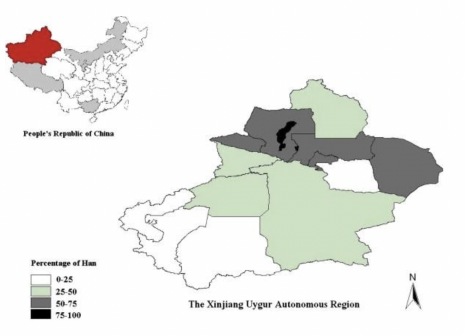
What you do with a place like Xinjiang, if you’re a CIA/DoD planner, is file it under “promote insurgency” — meaning “start as many small fires as possible,” rather than “invade and begin a conventional war.”
And in the meantime, you keep working on the real complaints of the Uyghur and other non-Han ethnic groups, so that if you do need to start a conventional war in the Formosa Straits, you can use the Uyghur as a diversion, a sacrifice, by getting them to rise up and be massacred. Since there’s a big Han-Chinese population in Xinjiang, as the map shows, you can hope to stir up the sort of massacre/counter-massacre whipsaw that leaves evil memories for centuries, leading to a permanent weakening of the Chinese state.
This is a nasty strategy, but it’s a standard imperial practice, low-cost — for the empire, not the local population, of course. It costs those people everything, but empires are not sentimental about such things.
This strategy worked well during the US attack on the Iraqi Army in Kuwait in the 1991 Gulf War. US intel used the legitimate complaints of the Iraqi Kurds and Shia, and convinced them to revolt by dropping leaflets promising US military support.
That was a lie, of course. The Iraqi Kurds were, like the Uyghur, a landlocked, stateless population spilling over into the territory of US/NATO allies, meaning it would’ve been logistically difficult and politically unwise to give them any real military support. The Iraqi Shia were more accessible, since Basra is very close to Kuwait — but the US was acting on behalf of Saudi Arabia in that war, and KSA can’t even tolerate its own Shia population. Offering effective help to Iraq’s Shia majority would have infuriated KSA, Israel, and the UAE, the only states the US worried about.
So once the Kurds and Shia had served their purpose, diverting Iraqi troops from the real front lines in Kuwait, both insurgent groups were left to the tender mercies of Saddam’s army.
BTW, if it seems I’m being too cynical here, let me add that I knew someone who was friends with a DIA agent who had the job of dropping leaflets in Iraqi Kurdistan urging the Kurds to revolt in the leadup to Operation Desert Storm. She asked him if he felt bad about stirring up a doomed insurgency. He said, “They’re all animals anyway.”
The woman who told me that story was no bleeding-heart liberal — far from it. But even she was shocked a bit. So “too cynical” is not a valid objection here.
The Uyghur in Xinjiang would serve the same purpose as the Iraqi Kurds: “straw dogs destined for sacrifice.” If you want to get really cynical, consider that the reprisals they’d face from an enraged Chinese military would be even more useful to the US/NATO side than their doomed insurgency itself.
Atrocity propaganda is very important in 21st c warfare. At the moment, there’s no evidence of real, mass slaughter in Xinjiang, yet we’re already getting propaganda claims about it. Imagine what US/NATO could make out of the bloody aftermath of a doomed insurgency. Well, assuming that US/NATO survived a war with China, a pretty dicey assumption. More likely, CNN, BBC, and NYT would be the first to welcome our new overlords, Kent Brockman style. Those mainstream-media whores aren’t too bright but Lord, they’re agile.
Hong Kong, one other widely publicized dissident region, is as hopeless as Xinjiang in terms of a beachhead for conventional war with China.
Just look at the map. Hong Kong is a great harbor but an indefensible peninsula on a heavily populated part of the Chinese coastline. Hell, the British couldn’t even hold it in WW 2 against an outnumbered Japanese invasion force. There is no way on earth it could be held against the PLA for even a day.
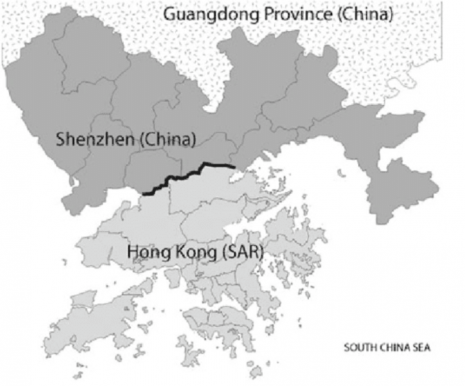
It’d be easier to defend Berkeley against the rest of America (a cool scenario, BTW — I wonder if anybody’s made it into a video game). Constantinople in 1453 would look like victory compared to any attempt to defend Hong Kong. Ever see Bambi vs. Godzilla? Like that.
Even as propaganda, Hong Kong won’t work very well. We know this, because it’s been tried, and didn’t pan out.
You may have noticed that a couple of years ago, stories on Hong Kong dissidents were constant in Anglo media. They’ve all but vanished now, in favor of Xinjiang stories. There are two reasons for this, and the difference in these two reasons illustrates something important about the weird double-vision of 21st c. conflict.
First, Hong Kong is an open society, stuffed full of good reporters. That means that it’s hard to reduce the problems there to a simple morality play. You can do that in Xinjiang because facts on the ground are very scarce (and nobody in the media wants to go there and spoil the dream, either) — but you can’t in Hong Kong. It’s a purely urban, argumentative, hyperliterate, online place, and ten minutes googling disabuses you of any notion that it’s a simple story of bad PRC vs. good dissidents. Families are deeply split, people are talking and acting messily on every side, and it’s just too much like real life to make a good sermon.
Xinjiang, by contrast, can easily be imagined as One Giant Concentration Camp. After all, our leading “expert” on the province has never been there, and neither have his readers.
So, if you’re a US/NATO planner, you file Xinjiang under “diversionary doomed insurgency, with PR benefits,” and Hong Kong under “agent recruitment/sleeper cells,” and consign both to small, side bets. That’s all you need to do, and given the godawful military record of US/NATO forces in recent warfare, that’s all you really want to do. You don’t want war. You may get it, but you don’t want it.
You’re running out of places to confront China at this point. Where else, Tibet? That’s been tried.
From the moment the PLA launched its uncharacteristically gentle takeover of Tibet in 1950, right up to the time Nixon and Kissinger started cozying up to Mao, US intelligence tried to create a Tibetan insurgency. You can guess how that went. It’s downright amazing the way US intel refused to concede that one of the few things Marxist-Leninist regimes were really good at was espionage and (especially) counter-espionage. A lot of trusting Tibetans died in those campaigns. A lot of Agency men got promoted. It’s a grim story.
So what’s left? Not much. China is just a hard target, as the past 70 years have shown. The Han-Chinese majority is becoming more nationalistic every year. The economy is booming, on the verge of knocking the US off the number one spot it’s held for 150 years. China has played this century smart, staying out of the black hole of Middle Eastern wars, picking up friends quietly, letting the US state make enemies.
Only Taiwan offers any hope to US military planners. And even that hope isn’t much. Back in the 1950s, US intel had high hopes that the remnants of the Kuomintang in Taiwan could be used to stage a Pacific D-Day, storming the beaches of Fujian and overthrowing the Communists. US rightists even had a slogan, “Unleash Chiang Kai-Shek,” which was kind of like threatening to unleash your Papillon-Shih-Tzu cross on the Lion Safari Park next door.
Truman listened to his saner generals and announced in 1950 that the US wouldn’t intervene in China/Taiwan disputes over the Formosa Straits. But the US elite was deeply factionalized even then, at the height of American power, and powerful elements of the DoD weren’t willing to let China alone.
MacArthur’s open 1951 revolt in Korea showed that elite commanders were willing to use nukes (34 of them, to be exact) to get rid of the CCP.
A real war with China was off the table, once the US military lost its 1950s infatuation with nukes, for the simple reason that nukes were the only possible way the US could win a war with China. The USSR came to the same conclusion during its 1969 border war with China, and may even have sounded out the US for permission to use these taboo weapons against Mao.
The only real scenario which offers US forces a chance to accomplish anything in military terms depends on China invading Taiwan. That’s the only reason you see so many articles in the Anglo media asking hopefully, “Will China Invade Taiwan?” I swear, they’re like kids on Christmas Eve, dreaming that Chinese fleets will swarm the Formosa Straits, making the Americans’ obsolete naval and air assets meaningful again.
You’ll notice that it’s a USN admiral leading the PR campaign boosting a PRC invasion of Taiwan. It’s downright embarrassing, how transparently this guy Aquilino is drooling over the prospect of a good ol’ fashioned 20th c. naval war in the Formosa Straits. He might as well order up some commercials with the slogan, in Mandarin and English, “Puhleeeze, China! Invade Taiwan! Make the US Navy relevant again!”
It reminds me of those sad commercials that California almond farmers ran when I was young, begging you to gobble “A can a week, that’s all we ask.”
It won’t happen, of course. No one really thinks it will, including Aquilino and his planning staff. The era of naval war based on carrier groups is over. They know that, even if they won’t say it.
If there’s a real war with China, the carriers will wait it out in San Diego harbor. I don’t say Honolulu, because even that wouldn’t be safe enough.
I’m not denigrating the courage or dedication of the crews and officers of USN vessels. At any level below JCOS, most of them are believers. But their belief is increasingly besieged and difficult to sustain, like an Episcopalian at Easter. You just can’t think too long about how cheap and effective antiship missiles are and still be a believer in aircraft carriers. As platforms of gunboat diplomacy against weak powers, they’re OK. No better than OK, as the USN showed in Lebanon in 1983, when it managed to lose two A-6s in one day, after the IDF’s air force had demolished the Syrian AF, knocking down 82 SAA aircraft and gutting their air defenses without losing a single plane.
The moral of that Lebanon story, not that anybody in DC wants to learn it, is that if you’re gonna do gunboat diplomacy, it’d be safer and about a thousand times cheaper to do it with actual gunboats than with carriers.
And that’s not even considering what would happen to those unbelievably expensive carriers in an all-out conventional war with China. The Pacific would gain some overpriced artificial reefs, and a lot of decent, trusting sailors would die without inflicting any damage on the “enemy.”
But the scenario is useful, useful for funding, which is the real purpose of the DoD. You all know the F-35 story by now, so I don’t need to go over it again, but keep the moral of that story in mind: defense appropriations have nothing to do with defending and everything to do with business.
At the moment, the eager scenarios promising that “we” could defeat a PRC invasion of China are so deeply stuck in 1940s strategic thinking that you might as well get your military news from the reenactors who show up at the park on weekends to bang each other up with homemade swords. That’s over too, but at least it doesn’t cost as much money or as many lives as a carrier-based attempt to defend Taiwan would.
Very few of these articles bother much with what’s going on in China itself. China is just The Enemy, the red force in some Fort-Irwin scenario that gives aspiring officers a chance to shine. The thing is, and it’s weird you even have to say this: China is a big strong country coming out of an era of deep national humiliation and suffering, proud of its new prosperity. China’s success in lifting a desperately poor population into something like prosperity will likely be the biggest story from this era, when the canonical histories get distilled.
A nation hitting this stage is likely to include a lot of people, especially young men, who are itching to show what their country can do. Their patriotic eagerness is no doubt as gullible as most, but it’s real, and if you pay any attention in the online world, you can’t help seeing it.
People who mouth off about China never seem to imagine that anyone in China might hear, because as we are told over and over again, China-is-an-authoritarian-
The only time you see anything about Chinese nationalism is when it’s used as one element of the war-fever talk: “Look! China’s gnashing its teeth! Buy us more carriers!” This is how most sources interpret the “Wolf Warrior” meme.
Wolf Warrior is a nationalistic Chinese war movie. That’s where the term “Wolf Warrior Diplomacy” comes from. The existence of such movies is deeply alarming…to the people who’ve watched Rambo II and III every night for decades, cheering every time Stallone shoots an NVA man with a arrow. (I say “*a* arrow” advisedly. “*An* arrow” gives far too much credit.) This stuff is so transparently stupid. It’s odd that life-long jingoists might be alarmed to discover that another great power has its own patriotic feelings, its own demographic eager for tales of martial glory.
If you know any recent Chinese history, any at all, then the PRC’s desire to reintegrate Taiwan doesn’t seem a very aggressive or frightening development, for the simple reason that the US used to be the most fierce advocate of Taiwan/Mainland China unity, to the point of madness. Until Nixon and Kissinger abandoned Taiwan for Beijing, the US was, to use a newspaper word, “adamant” that there was only one China.
And even after the big visit, years passed before the US acknowledged publicly that the PRC existed. Until 1979 — 1979! — the US insisted with a straight face that Chiang Kai-Shek’s exiled elite in Taiwan were the only legitimate government of China, all China, from Xinjiang to Taipei. The PRC did not exist. There was no US diplomatic representation in Beijing, no official contact. Everything had to be done by a farcical go-between, usually some European country willing to concede that Taiwan did not actually rule in Beijing.
At this point, the US/NATO elite believed more strongly than the PRC elite does now that there is only one China — that the mainland and Taiwan were part of the same country. That was the whole basis for ignoring the PRC.
Given the history of US/China relations, from the pogroms against Chinese immigrants to the Chinese Exclusion Act of 1882, through the demonization of Chinese mainlanders in the Cold War (which I remember distinctly from elementary school scare movies), the endless attempts to start insurgencies in Tibet, Xinjiang, and Fujian, to the nonstop violence and abuse of Asians in America, you don’t need to find reasons for Chinese people to want a war.
The odd thing is that most of them don’t seem to. That’s a remarkable testimony to the discipline and good sense of the Chinese public…so far. And it’s also, if you’re thinking clearly, a good reason not to keep provoking China in such gross, pointless ways. A population with that level of discipline and unity, matched with zooming prosperity, technical expertise, and pride on emerging from a long nightmare, is not one to woof at.
Of course the plan in the Pentagon is not real war. The plan is to slow China down, trip it up, “wrong-foot it” as they say in the Commonwealth.
Along the way, all of the populations Western media consumers are exhorted to care about can be sacrificed. They’ll vanish as quickly as the Tibetans vanished when their usefulness was exhausted. (Adrian Zenz started as a Tibetan specialist, BTW. He switched to Xinjiang when the bottom fell out of the Tibetan-provocation market in the 1990s.)
So what will China do about Taiwan? China could take it right now, if it wanted to pay the price. Everyone knows that, though many fake-news sites have responded with childish, ridiculous gung-ho stories about how “Taiwan Could Win.”
But will China invade? No. Not right now anyway. It doesn’t need to. The Chinese elite has its own constituencies, like all other polities (including “totalitarian” ones), and has to answer to them as circumstances change.
So far China has been extraordinarily patient, a lot more patient than we’d be if China was promising to fight to the death for, say, Long Island. But that can change. Because, as I never tire of repeating, the enemy of the moment has constituencies too. And has to answer to them.
So what happens if the US succeeds in hamstringing China’s economy? Welp, what’s the most reliable distraction a gov’t can find when it wants to unite a hard-pressed population against some distant enemy?
That’s when China might actually do something about Taiwan. Oh, not the silly 20th c. style invasion the USN dreams about. That’s nonsense. The PLA has contingency planners too, and they won’t want to play those retro games. There’s a whole new military technology and an evolving strategy to optimize it, and it includes dozens of ways to neutralize carrier battle groups. Planning that campaign is probably the most requested assignment among ambitious PLA planners.
And that’s how this looks, when you stare coldly: If our military and media elites are very lucky, China will zoom ahead and ignore the endless woofing. But if US/NATO somehow succeed in crippling China’s economy, then, as Mao might put it, the flabby Golden Retriever woofing behind its picket fence at the pit bull might find that the yard gate is open.
Or, to come down out of the metaphors: Taiwan is a permanent, legitimate casus belli for China. It can be ignored when things are going well domestically, but is always available for use if the economy goes badly and the PRC elite needs a distraction.
It will be interesting to see how the Anglo media, now doing its Sidney Ferocious routine, reacts when and if that happens. My money is on a light-speed Kent Brockman flip.
Gary Brecher is the nom de guerre-nerd of John Dolan. Buy his book The War Nerd Iliad. Hear him read his comic memoir Pleasant Hell in audiobook format.
Subscribe to the Radio War Nerd podcast & newsletter!
April 12th, 2021 | Leave Comment

















